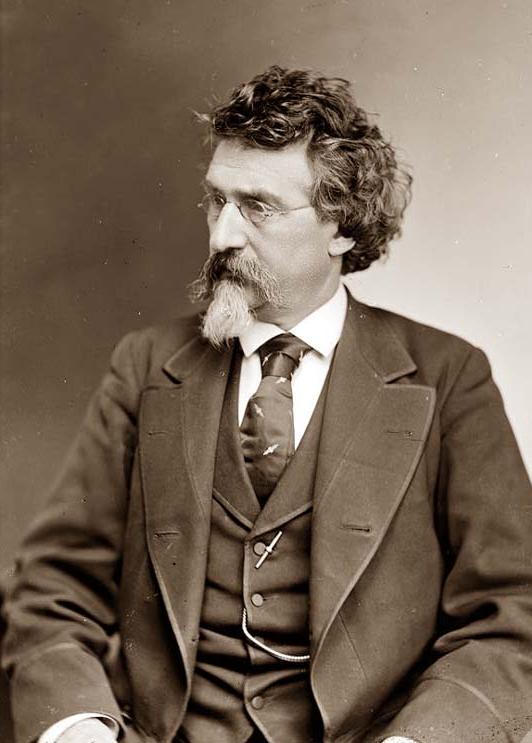|
|
|
(1823-1896) |
|
Mathew
Brady is considered the "Father of
Photojournalism," for his work in
photographing the American Civil War in
the 1860s. His parents were immigrants
from Ireland, and Mathew was born in
Warren County in New York
State. Mathew
Brady studied under Samuel Morse
beginning in 1839. Also that year, he
met Louis Daguerre, the inventor of the
early photograph, the Daguerreotype.
Brady took his newfound knowledge in
photographic science back to the United
States and opened his own
gallery. In
1850, Brady published a collection of
photographs featuring the most famous
Americans of his time, called "A
Gallery of Illustrious Americans."
Among the important Americans posing
for Brady's portraits was an Illinois
politician named Abraham Lincoln.
Lincoln later used Brady's portrait of
him in his presidential campaign. He
met Juliette Handy at his photography
studio, and they married in 1851. When
she died in 1887, he became depressed
and alcoholic. By the
time of the secession crisis and the
beginning of the Civil War, Mathew
Brady was already quite famous as the
leading photographer of his day.
Determined to record the history of the
war in photographs, Brady organized a
team of professional photographers to
follow the Union army as it fought. The
collection of photos from this
enterprise, titled "The Photographic
History of the Civil War," is
considered an important and stunning
record of the war, capturing not only
the glory of the war, but also the
horrible cost of combat. While
considered today as a valuable book, at
the time, his profits from its sale did
not make up for his cost in outfitting
his staff of photojournalists, which
cost at least $100,000 (a very large
amount of money in the 1860s). In
addition, a post-war economic
depression cost him many of his other
investments, and, by the time he died
in 1896, he was a poor man, suffering
from alcoholism and loneliness. Most of
Brady's photographs now reside in the
public domain (meaning they belong to
the public, and are not the private
property of any one person or
business), because Congress bought his
collection for $2,840 in
1875. There
are many opportunities in our world
today for photographers, perhaps check
out a Photography
School
and you can begin your own professional
collection just like Mathew
Brady. Links
and Resources Internet
Links: Photo-Seminars.com:
Mathew Brady
--Biography and career summary of the
famous professional photographer of
American history. Photography
at Temple: Mathew
Brady
--Photos and a biographical profile of
the pioneer of Civil War
photography. A
History of
Photography--by
Robert Leggat. Smithsonian
National Portrait Gallery: Mathew
Brady's
Portraits
--Includes a biographical timeline,
essays, photo technique descriptions,
and a collection of portraits by the
American legend of
photography. Sons
of the South: About Mathew
Brady
--Exhibits photographs and a summary of
the life and career of the man
responsible for most of the photographs
made during the Civil War. Spartacus
Education: Mathew
Brady
--Overview of the master of portrait
photography. "The
History Guy" is a Registered Trademark. Contact
the webmaster |
Historyguy.com Search
Engine
Join the
FREE Historyguy Update list. Receive regular
updates delivered right to your
inbox.
Email
Marketing You Can Trust Personal
Data Role
in the war years: Mathew Brady
recorded the Civil War in an impressive
collection of photographs. Many of the
images used in most books and websites on
the American Civil War are from Brady's
collection. Also, at the time of the war,
his photos enabled civilians on the
homefront to see what the war really
looked like. Brady
is considered the "Father of
Photojournalim." Date
of Birth: 1823 Date
of Death: January 15, 1896 Occupation:
Photographer Post-War:
Professional Photographer, owner of his
own photo gallery World
Biography-More
pages on contemporaries of Mathew
Brady Clara
Barton--
The "Angel of the Battlefield"
who brought nursing care to
wounded soldiers during the Civil
War and later founded the
American Red
Cross. Mathew
Brady--
The "Father of Photojournalism"
whose photos of Civil War
battlefields brought the horrors
of war home to civilians on the
homefront. Dr.
Benjamin
Rush--
Signer of the Declaration of
Independence, member of the
Constitutional Convention, noted
physician and ardent supporter
for the abolition of
slavery. Thomas
Nast-American
political cartoonist. General
George Armstrong
Custer--
Famous American Cavalry officer
who died at the Battle of the
Little Bighorn in
1876. General
Robert E.
Lee--
The commanding general for the
South in the American Civil
War.--New Lorenzo
de Zavala--First
Vice-President of the Republic of
Texas. Site
Map--revision
in progress |
||||||||||||||||||||||||||||||||||||||||||||||||||
